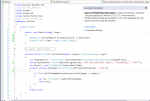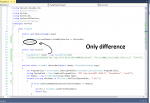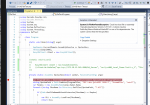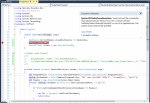Hi.
I wrote a very simple client to send data to OPC UA server. I am using VS2017 Comm, Win10 x64, oficial Dll library of OPCLabs - purchased with license.
OpcLabs.EasyOpcUA, Version=5.57.125.1, Culture=neutral, PublicKeyToken=6faddca41dacb409, processorArchitecture=MSIL"
Now, everything works just fine - I make reference to dll/copy local, using them, instant. client, write value. Value is on the server, super.
But what if I don't want the dll in the same folder as exe file? Let's say dll will be always in c:/test/lib.dll... How to tell the program, to load the library from other place than basedir?
Something like exe.config, but not just the subdir, but anywhere.
exe.config works... for subdirectory.
I am playing with Assembly.Load/LoadFile/LoadFrom, but no luck.
I am playing with AssemblyResolver using embeded ressource but no luck.
I am very new to C#.
Thanks in advance for yor advices.


I wrote a very simple client to send data to OPC UA server. I am using VS2017 Comm, Win10 x64, oficial Dll library of OPCLabs - purchased with license.
OpcLabs.EasyOpcUA, Version=5.57.125.1, Culture=neutral, PublicKeyToken=6faddca41dacb409, processorArchitecture=MSIL"
Now, everything works just fine - I make reference to dll/copy local, using them, instant. client, write value. Value is on the server, super.
But what if I don't want the dll in the same folder as exe file? Let's say dll will be always in c:/test/lib.dll... How to tell the program, to load the library from other place than basedir?
Something like exe.config, but not just the subdir, but anywhere.
exe.config works... for subdirectory.
I am playing with Assembly.Load/LoadFile/LoadFrom, but no luck.
I am playing with AssemblyResolver using embeded ressource but no luck.
I am very new to C#.
Thanks in advance for yor advices.






